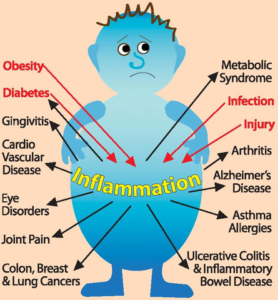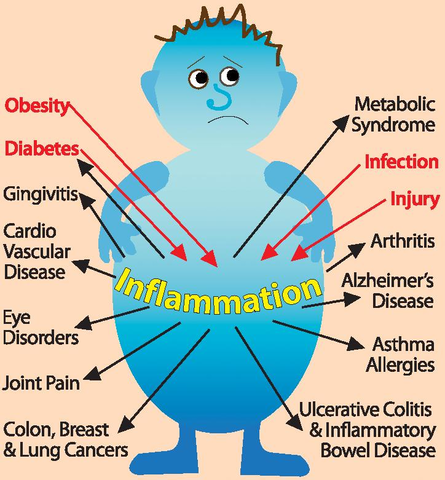 There are some buzz words you probably hear so often, you end up tuning out when they come up. I’m going to guess that “inflammation” is likely one of those words.
There are some buzz words you probably hear so often, you end up tuning out when they come up. I’m going to guess that “inflammation” is likely one of those words.
Not only is it a buzz word, it’s also a bit ambiguous if you aren’t really familiar with it.
Inflammation is part of your body’s immune response, it occurs when your body tries to heal damaged cells, and it fight off irritants and pathogens. Your arteries dilate, blood flow increases, and white blood cells, hormones, and nutrients flow freely. The injured area is swarmed by white blood cells, along with fluid that causes the often-painful swelling.
It can be uncomfortable, but it’s usually a good sign, that your body is working to heal itself.
For example, if you injure your toe, it gets red, swollen, and inflamed. If you get a bee sting, you experience inflammation in your skin. If you have a cold, you experience inflammation as your body heats up to fight the infection.
But there are two types of inflammation: acute and chronic. Acute is what happens when you have a sudden injury, as in the examples above.
Chronic inflammation, however, occurs when the body thinks there is an internal threat, that doesn’t really need an inflammatory response. Then the swarming white blood cells have nowhere to go, and sometimes attack other organs or tissues.
Just like that bee sting, inflammation is your body’s response to stress, whether that stress comes from your environment, diet, or lifestyle. Chronic inflammation occurs when your body or environment get – and stay – out of balance in some way.
If you are under constant stress – emotional or physical – it raises your cortisol level, which creates a cascade of events in your body. Increased cortisol is how your body prepares for fight-or-flight; it inhibits some body functions, like insulin production, and increases other body functions, like the heart rate.
Some of the possible results of long-term stress due to increased cortisol levels and inflammation include: suppression of your immune system; digestion problems; heart problems; obesity; and fertility problems. Chronic inflammation may also cause diseases such as endometriosis, allergies, asthma, or even cancer.
Many people who suffer from chronic inflammation are not careful with their diet or lifestyle. If you eat too much fat, sugar, and protein, drink too much soda or caffeine, and don’t get enough exercise, sleep, and water, it can cause all kinds of inflammation problems.
If you have chronic inflammation, you may experience symptoms like these:
- Acid reflux
- Skin conditions like psoriasis or acne
- Arthritis
- Bronchitis
- Diabetes
- High blood pressure
- Signs of aging, like wrinkles
- Frequent illness due to colds and flus
- Chronic pain
- Urinary tract infections
- Fatigue
- Mouth sores
- Chest or abdominal pain
- Rashes
- Joint pain…
How do you prevent chronic inflammation?
Some things you can’t control but some things you can. It’s all about the choices you make, every day. Here are a few things you can do to give your body a fighting chance to avoid chronic inflammation, and the resulting maladies:
Watch what you eat. Don’t overeat, especially sugars, fats, proteins, and caffeine. Eat more “real foods”. In fact, the fewer ingredients in your food, the better. The best thing is one ingredient: carrots; celery; apples; etc.
Figure out if you have some food sensitivities. Some people suffer from inflammation due to a sensitivity to wheat products (bread, pasta, etc.). Cut down on them drastically – or even cut them out completely – and not only will you lose weight, you’ll feel a lot better too. You’ll likely have less joint pain and more energy, as well as clearer skin.
Floss your teeth. Just like your dentist tells you to. Gingivitis is a form of inflammation, and can actually contribute to inflammation in the heart and blood vessels; not a good thing.
Get more sleep. Your body needs this time to repair and restore. It’s when your body “takes out the trash”, all the toxins and damaged cells. You don’t want those floating around, do you?
Watch your substance use. Smoking and excessive alcohol will definitely harm your health. If you over-indulge when you’re stressed, you’re not just calming yourself down, you’re putting extra stress on your body.
Lose weight. Obesity actually creates more inflammation, which in turn, makes it harder to lose weight. Reduce inflammation in other ways, and it will be easier to lose weight.
Reduce stress in your life. Yes, easier said than done. Do meditation, diaphragmatic breathing, daily exercise, and develop stress-coping strategies.
I know this seems like a tall order. Many people don’t even know they suffer from chronic inflammation. So I’d really like to speak with you about the changes you can make easily, right away, that will help you feel better and have more energy.
If you have any questions or want to set up a time to talk, reach out.




Leave a Reply